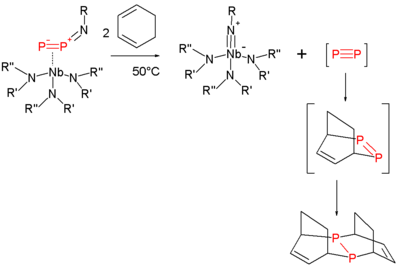Christopher C. Cummins
Christopher Colin Cummins (born February 28, 1966) is an American chemist currently the Henry Dreyfus Professor at Massachusetts Institute of Technology. He has made contributions to the coordination chemistry of transition metal nitrides, phosphides, and carbides.[2][3]
Kit Cummins | |
|---|---|
| Born | Christopher Colin Cummins February 28, 1966 |
| Nationality | U.S. |
| Alma mater | |
| Awards |
|
| Scientific career | |
| Fields | Organometalic chemistry |
| Institutions | Massachusetts Institute of Technology |
| Thesis | Synthetic investigations featuring amidometallic complexes (1993) |
| Doctoral advisor | Richard R. Schrock |
| Other academic advisors | Peter T. Wolczanski |
| Doctoral students | Brandi Cossairt |
| Other notable students |
|
| Website | ccclab |
In one contribution, Cummins and coworkers described routes to simple phosphorus compounds including a low temperature route to diphosphorus:[4]
Early life and education
Cummins was born in Boston, Massachusetts, on February 28, 1966. He attended Middlebury College and Stanford University before transferring to Cornell University where he performed undergraduate research under the direction of Peter T. Wolczanski.[5] After graduating from Cornell with an A.B. degree in 1989, Cummins went to the Massachusetts Institute of Technology to obtain his Ph.D. in chemistry in 1993 under the direction of Richard R. Schrock.[6] After receiving his Ph.D., Cummins was invited to stay at MIT as an assistant professor and was later promoted to full professor in 1996. Cummins became the Henry Dreyfus Professor in Chemistry in 2015.[7]
Honors and awards
In 2007, Cummins was awarded the 2007 Raymond and Beverly Sackler Prize in the Physical Sciences by Tel Aviv University[8] and the 2007 F. Albert Cotton Award by the American Chemical Society.[9]
In 2008, Cummins was elected a fellow of the American Academy of Arts & Sciences.[10]
In 2013, Cummins was awarded the Ludwig Mond Award by the Royal Society of Chemistry.[11]
In 2017, Cummins was elected as a member of the National Academy of Sciences.[12] In the same year, the American Chemical Society awarded Cummins the 2017 Linus Pauling Medal in recognition of his synthetic and mechanistic studies of early-transition metal complexes.[13]
References
- "Polly Arnold - EPSRC website". epsrc.ukri.org.
- "Christopher Cummins". Massachusetts Institute of Technology. Archived from the original on May 5, 2017. Retrieved May 1, 2017.
- "Christopher Cummins". Massachusetts Institute of Technology. Retrieved May 1, 2017.
- Piro, Nicholas A.; Figueroa, Joshua S.; McKellar, Jessica T.; Cumnins, Christopher C. (1 September 2006). "Triple-Bond Reactivity of Diphosphorus Molecules". Science. 313 (5791): 1276–1279. Bibcode:2006Sci...313.1276P. doi:10.1126/science.1129630. PMID 16946068. Retrieved 21 July 2013.
- "Professor Christopher C. Cummins". Massachusetts Institute of Technology.
- Cummins, Christopher Colin (1993). Synthetic investigations featuring amidometallic complexes (PhD. thesis). Massachusetts Institute of Technology. hdl:1721.1/12718. OCLC 28863744.

- "Three Faculty named to Chairs". Massachusetts Institute of Technology. March 13, 2015. Archived from the original on September 16, 2015. Retrieved May 12, 2018.
- Wang, Linda (August 20, 2007). "Sackler Prize Winners Announced". Chemical & Engineering News. 85 (34). pp. 75–76.
- Dagani, Ron (January 15, 2007). "F. Albert Cotton Award in Synthetic Inorganic Chemistry". Chemical & Engineering News. 85 (3). p. 60.
- Rovner, Sophie L. (April 29, 2008). "American Academy Of Arts & Sciences Elects New Fellows". Chemical & Engineering News.
- "Cummins selected for RSC Ludwig Mond Award". Massachusetts Institute of Technology. April 29, 2013. Archived from the original on September 15, 2015. Retrieved May 12, 2018.
- "News from the National Academy of Sciences". National Academy of Sciences. May 2, 2017.
- Randall, Danielle (June 28, 2017). "Kit Cummins awarded the American Chemical Society Pauling Medal". Massachusetts Institute of Technology.
